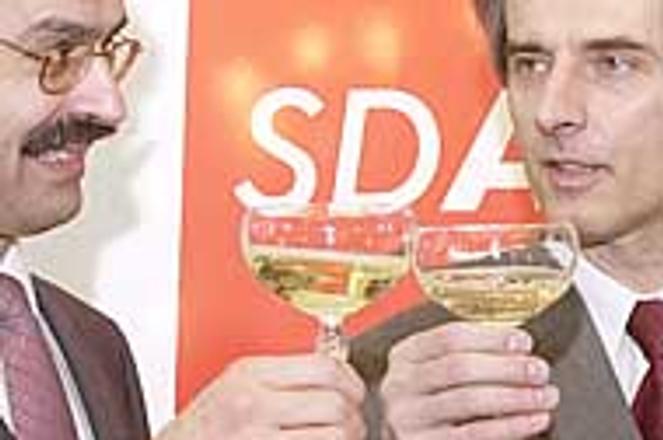TOASTING an uncertain future, Ftáčnik (left) and Weiss vow to return to parliament.photo: TASR
THE COUNTRY'S newest left-wing party, the non-parliamentary Social Democratic Alternative (SDA), padded its leadership ranks last weekend with the election of former Education Minister Milan Ftáčnik to the party chairmanship.
Ftáčnik, who had served in his post as the nominee of the ruling coalition Democratic Left Party (SDĽ), agreed on April 12 to leave the cabinet seat to his former party.
Having left the SDĽ to enter the SDA on March 26, Ftáčnik joined other former top SDĽ members Brigita Schmögnerová and Peter Weiss at the SDA's founding congress on April 13. The 159 delegates elected Ftáčnik party leader and Weiss vice-chairman.
Ftáčnik said the SDA did not plan to ally itself with other left-wing parties in the run-up to September elections, adding that the party would appeal to "left wing voters who are disappointed with the policies of the SDĽ and the SOP [ruling coalition Civic Understanding Party], and offer them our brand of modern social-democratic politics".
The SDA, in its first political poll results, has already matched the strength of the faltering SDĽ, having captured some of the SDĽ's most popular politicians.
As Ftáčnik was elected, Defence Minister Jozef Stank reiterated his fellow-feeling for the SDA, but said he would stay in his post and with his party to ensure the continuity of military reform.
"I sympathise with the SDA, but at the moment I want to do my utmost to ensure that Slovakia receives an invitation to join Nato," he said, adding that "if I changed my political colours and left my post, this country wouldn't benefit from it."
SDĽ Vice-Chairman Ladislav Orosz resigned his party post on April 13, although he remains a regular party member. "In the situation the party finds itself, I think the people in the party leadership have to believe that the SDĽ can succeed in the next elections. Since I don't believe this, I think it's right I give up the post," he added.
Orosz, who is one of six candidates running for a job as a Constitutional Court judge, ruled out joining the SDA before the end of the government's term.
"I plan to leave politics and work in my field of expertise," said the constitutional lawyer.
With the SDA's political fortunes brightening from the defections, the SDĽ leadership has taken an ambiguous stand on co-operation with Ftáčnik's rebels.
While SDĽ leader Pavel Koncoš has said that "any left-of-centre party is our rival and we must behave accordingly," the party's central secretary Ján Richter said on April 14 that he was "very sorry that the SDA has closed its doors so quickly to co-operation with the SDĽ".
Weiss argued that if the SDA agreed to work with a party that its new leaders had so recently abandoned because of disagreement with SDĽ policies under Koncoš, it would only confuse the electorate.
"Our voters wouldn't understand us," Weiss said.
Weiss claimed that the SDA could attract between 5 and 10 per cent of the vote in September, although a March 2002 poll by the Focus agency gave both the SDA and SDĽ 3.1 per cent. To be eligible for seats in parliament, parties must score at least five per cent.
Rather than the SDA's good fortune, however, many politicians called the disarray of the left a threat to political balance and the long-term survival of the socialist tradition in Slovakia.
"Either the SDA succeeds in elections or the left is finished in parliament for the next 10 years," said Daniel Šmihula, an SDA member, at the April 13 congress.


